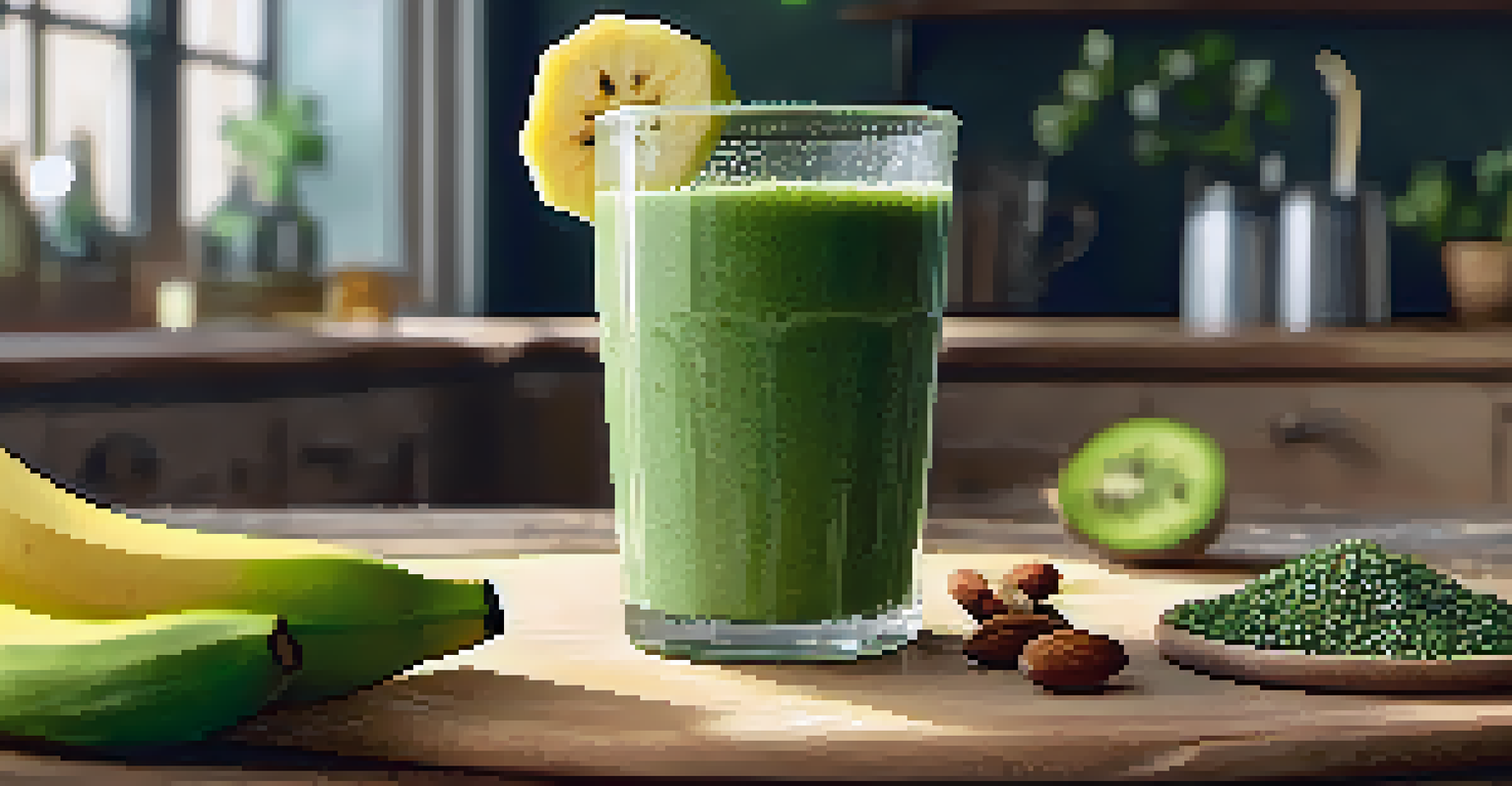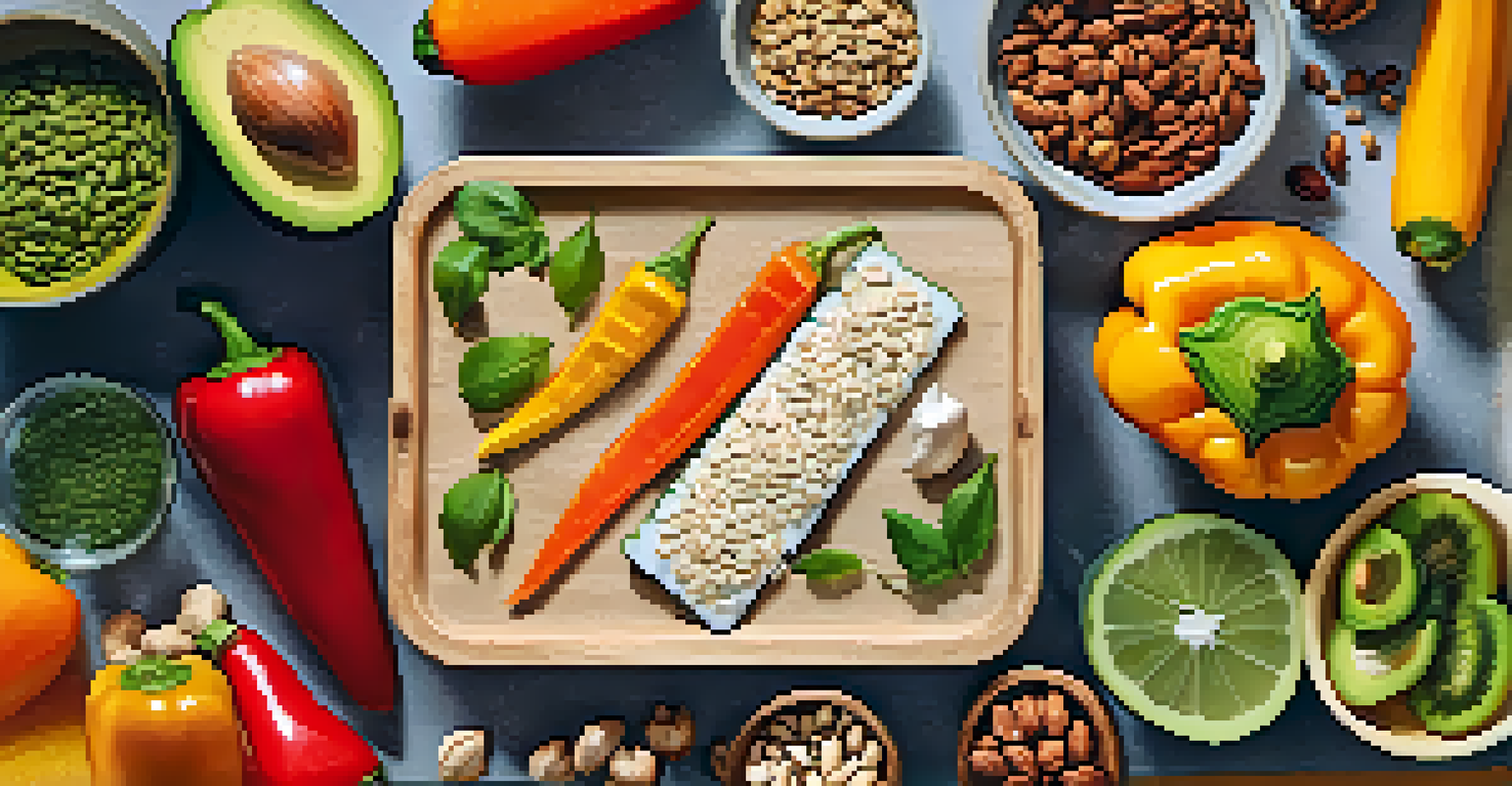Raw Food Diet Basics: A Gateway to Better Gut Health

Understanding the Raw Food Diet: What It Is
The raw food diet primarily consists of unprocessed, whole foods that are either uncooked or heated to no more than 118°F (48°C). This diet emphasizes fruits, vegetables, nuts, seeds, and sprouted grains, aiming to preserve the natural enzymes and nutrients that cooking can destroy. Adopting a raw food diet can seem daunting at first, but it’s all about embracing fresh, vibrant foods that nourish your body.
Let food be thy medicine and medicine be thy food.
Many people are drawn to this diet for various reasons, including weight loss, increased energy, and improved overall health. Picture biting into a juicy apple or a crisp cucumber; these foods are packed with vitamins and minerals that our bodies crave. The idea is to connect with nature’s bounty, focusing on foods in their most natural state.
While transitioning to a raw food diet, it's essential to listen to your body and find a balance that works for you. Some might choose to incorporate cooked foods occasionally, while others may dive headfirst into a fully raw lifestyle. Ultimately, the goal is to enhance your well-being and promote gut health.
The Gut Health Connection: Why It Matters
Gut health is an essential aspect of overall wellness, impacting everything from digestion to mood regulation. A healthy gut houses a diverse microbiome, which plays a crucial role in breaking down food and absorbing nutrients. When your gut is thriving, it can help prevent various health issues, including obesity and autoimmune disorders.

Imagine your gut as a bustling city where different bacteria work together to keep things running smoothly. When this balance is disrupted, it can lead to symptoms like bloating, gas, or even anxiety. A raw food diet can help restore this balance by providing a wealth of fiber and probiotics, which are beneficial for gut flora.
Raw Foods Boost Gut Health
A raw food diet enhances gut health by providing fiber, enzymes, and antioxidants that support digestion and nutrient absorption.
Incorporating raw foods into your diet introduces a variety of nutrients that support gut health, such as antioxidants and enzymes. These components help reduce inflammation and promote healthy digestion. By prioritizing gut health, you’re setting the foundation for better physical and mental well-being.
Fiber: The Unsung Hero of Gut Health
One of the biggest benefits of a raw food diet is its high fiber content. Fiber is crucial for maintaining a healthy digestive system, as it adds bulk to your stool and helps it move smoothly through your intestines. Foods like raw fruits and vegetables are packed with soluble and insoluble fiber, which can ease constipation and promote regularity.
You are what you eat, so don’t be fast, cheap, easy, or fake.
Think of fiber as a broom for your gut, sweeping away toxins and waste while nurturing friendly bacteria. This helps create a balanced environment in your gut, making it less susceptible to harmful bacteria. By consuming raw foods, you’re naturally increasing your fiber intake without even trying.
Moreover, the fiber in raw foods can help regulate blood sugar levels and reduce cholesterol, leading to overall better health. This makes the raw food diet not just a fad, but a sustainable approach to wellness. As you embrace more raw foods, you’ll likely notice improvements in your digestive health and energy levels.
Hydration: A Key Component of Raw Foods
Staying hydrated is crucial for gut health, and a raw food diet can help you achieve this effortlessly. Many raw fruits and vegetables have high water content, contributing to your overall fluid intake. For instance, cucumbers and watermelons are not only refreshing but also hydrating, making your meals enjoyable and beneficial.
Proper hydration helps maintain the mucosal lining of the intestines, which is essential for digestion and nutrient absorption. When your body is well-hydrated, it can flush out toxins more effectively, reducing the strain on your digestive system. Think of hydration as the oil that keeps the machinery running smoothly.
Hydration Through Raw Foods
Many raw fruits and vegetables are hydrating, which helps maintain the mucosal lining of the intestines and supports overall digestion.
Additionally, consuming raw, water-rich foods can help curb cravings, making it easier to maintain a balanced diet. By focusing on hydration through raw foods, you're not only supporting your gut health but also nurturing your overall well-being. It’s a simple yet effective way to enhance your diet.
Enzymes: The Powerhouses of Raw Foods
Raw foods are rich in natural enzymes that aid in digestion, making them a vital part of gut health. These enzymes help break down food into smaller, more absorbable molecules, allowing your body to utilize nutrients more effectively. Cooking can destroy many of these enzymes, which is why raw foods can be so beneficial.
Imagine enzymes as tiny workers in your digestive factory, tirelessly breaking down food and ensuring everything runs smoothly. When you consume foods rich in these enzymes, you’re giving your digestive system a helping hand. This can lead to less bloating and discomfort after meals, as your body processes food more efficiently.
Incorporating enzyme-rich raw foods into your diet can enhance your overall digestive health and nutrient absorption. By choosing fresh, raw ingredients, you’re not just fueling your body; you’re also providing it with the tools it needs to thrive. This simple adjustment can have a profound impact on your gut health.
Antioxidants: Protecting Your Gut Health
Another significant advantage of a raw food diet is the abundance of antioxidants found in fresh fruits and vegetables. Antioxidants combat oxidative stress, which can lead to inflammation and gut-related issues. By consuming raw foods, you’re giving your body a powerful defense against various health threats.
Picture antioxidants as the bodyguards of your gut, standing ready to neutralize harmful free radicals. These compounds help protect the cells that line your digestive tract, promoting a healthier gut environment. Foods like berries, leafy greens, and nuts are particularly rich in these protective agents.
Transitioning to Raw Made Easy
Starting a raw food diet can be simple; begin by gradually incorporating more raw fruits and vegetables into your meals.
Integrating more antioxidant-rich raw foods into your diet can lead to improved gut health and overall wellness. Not only do they help reduce inflammation, but they also support your immune system. By prioritizing these foods, you’re investing in your long-term health and vitality.
Getting Started: Tips for Transitioning to Raw Foods
Transitioning to a raw food diet doesn’t have to be overwhelming; it’s all about taking small steps. Start by incorporating more raw fruits and vegetables into your meals, gradually increasing their presence over time. You might begin with simple snacks like carrot sticks or celery with hummus, which are easy to prepare and delicious.
Another tip is to explore raw recipes that excite your palate. Think smoothies, salads, or even raw desserts made with nuts and dates. Finding creative ways to enjoy raw foods can keep your meals interesting and satisfying, making the transition feel less like a chore.

Remember, it’s okay to take your time and find what works best for you. You don’t have to go fully raw overnight; even small changes can lead to significant improvements in your gut health. Embrace the journey, and enjoy discovering the wonderful world of raw foods.